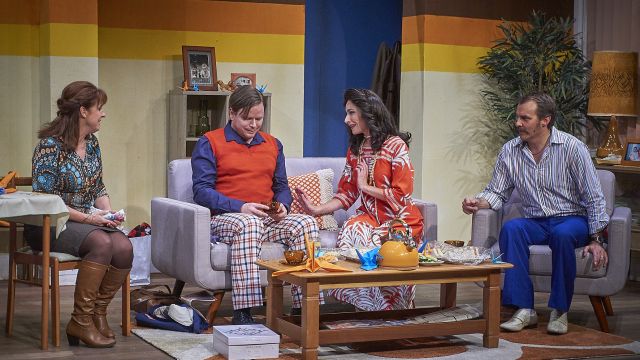Absent Friends
It is fantastic to see an amateur theatre company reveling in the words of Alan Ayckbourn. Lilydale Athenaeum’s current season, Absent Friends, is one of his lesser-known works.
Set in 1974, in the modest lounge room of Diana and Paul, sits Evelyn with her baby Harry. Diana quizzes Evelyn about her relationship with her husband Paul, trying to get Evelyn to admit that they are having a love affair; all whilst attempting to finalise tea party arrangements for their ‘absent friend’, Colin, who has just lost his fiancée (who had recently drowned). Marge arrives, and Diana enlists her in getting Evelyn to admit the affair.
Just then Paul arrives home from his ‘squash game’ to an icy emotional wife, who is sure that he has been cheating on her for quite some time now.
John, Evelyn’s husband, and later, the happy and joyful (!) Colin arrive for the tea party, and as in all Alan Ayckbourn plays, hilarity ensues, bordering on the farcical during miss-communiqués and physical comedy moments.
The play is predominately about the numerous opposing relationships between husband and wife: the subjugated woman denied her rights to have a job AND raise her family; the strong woman holding together her relationship with the less than resilient husband; and the childless woman imposing her maternal mindset onto an ailing husband.
Each woman played her role commendably. Adrienne George, who plays Diana, delivered a stirring monologue about desperately wanting a red coat in her youth as it reminded her of her desire to become a member of the Canadian Mounted Police (which she was eventually denied because of her gender).
Lindy Yeates, as Marge, was effective in her role as the surrogate mother to her husband and friends, using her vocal qualities effectively to depict her role.
 Donna Cleverly was the clear standout performer in this production. The stoic character Evelyn does not have much to say, but Donna cut between those short lines of dialogue and heightened the character, as so much of her subtle comical performance was composed nearly entirely of understated gestures through expression and subtle movement. It was hard to keep your eyes off her; you didn’t want to miss her reaction to what was happening on stage. Donna sustained this technique throughout the entire performance, never wavering even during the heightened farcical moments.
Donna Cleverly was the clear standout performer in this production. The stoic character Evelyn does not have much to say, but Donna cut between those short lines of dialogue and heightened the character, as so much of her subtle comical performance was composed nearly entirely of understated gestures through expression and subtle movement. It was hard to keep your eyes off her; you didn’t want to miss her reaction to what was happening on stage. Donna sustained this technique throughout the entire performance, never wavering even during the heightened farcical moments.
The male actors were juxtaposed with the women in more ways than one. This show was certainly a showcase for the talent of the female cast. Stephen Freeman as Diana’s husband Paul was too quiet and showed a lack of emotion in his role, making him not altogether convincing as the sly ladies’ man. Div Collins, as Colin, was over the top and at times overbearing. It certainly would have been interesting had the director reversed his casting decisions between these men. Trent Bockman as Evelyn’s husband John was like a little jumping bean, contrasting to her apathetic emotions, but took it a little bit too far (as probably the script intoned, however the director needed to take a bit of creative license here), but his performance was the most credible and consistent of the men.
Director Peter Roberts needed to trust the real-life moments in the script, allowing greater light and shade within the darker aspects of the human emotions on stage. The farcical moments needed to contrast with these genuine emotions and build up and above, letting the physical comedy reach nearly the point of no return. This would have ensured sidesplitting moments throughout the dramatic ‘real-time’ comedy.
Penelope Thomas
Subscribe to our E-Newsletter, buy our latest print edition or find a Performing Arts book at Book Nook.

